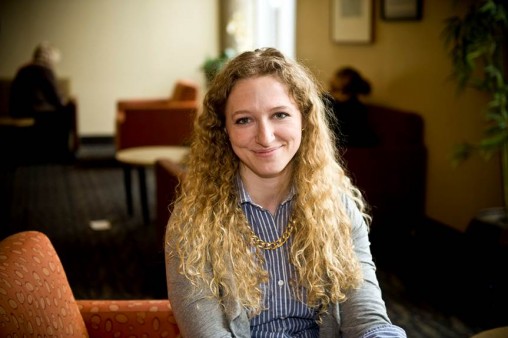
Michelle Sobon, a School of Professional Psychology graduate student, has developed therapies for victims of sex trafficking.
When Michelle Sobon was a sophomore at Indiana Wesleyan University, an alumna came to campus and spoke about how she had used art therapy to treat young victims of sex trafficking in Cambodia.
The fact that girls as young as 5 years old were being trafficked horrified Sobon. It was a career-defining moment.
“Something about it struck a chord with me,” she recalled. “It was kind of the existential crisis that a lot of college kids have—that the world is bigger than me and there are bigger problems than mine and I want to do something about it.”
Sobon went on to become involved with—and president of—the campus social justice organization and an anti-trafficking advocate.
“I knew I could do after-care and prevention work for girls who have been trafficked,” she said. “I could connect my passions with my skills, my career aspirations.”
Today, Sobon is a graduate student working on her Psy.D. at Wright State University’s School of Professional Psychology. As part of her dissertation, she conducted extensive research into the sex trafficking industry and therapies for its victims. She concluded that therapists need to acknowledge and make greater use of the resilience victims develop from the experience.
“The push within my research is for the mental health field to view them also as courageous survivors of a horrific crime,” Sobon said. “We forget that this person still has a great amount of strength and resources. We just focus on the harm because the harm is there and the harm is so glaring. But that’s not all that’s there.”
Sex trafficking is defined as the recruitment, harboring, transportation or obtaining of a person for the purpose of a commercial sex act where such an act is induced by force, fraud, coercion or in which the person induced is younger than 18. There are nearly 2 million children in the commercial sex trade worldwide, according to the UNICEF.
Sobon said victims of sex trafficking come from all socioeconomic backgrounds. Traffickers zero in on insecurity and vulnerability. Girls fighting with their parents and who sometimes leave their homes in the evening to get away can be targets. Parties, shopping malls and bus stops are common places to recruit them.
A common scenario is for a girl to have an older boyfriend who initially lavishes her with attention and gifts, slowly withdraws his love and then pushes her to have sex with his friends for money. Sometimes an older girl befriends a victim, discovers her needs and concerns, and then recruits her, often for a man.
“The kids who are most at risk aside are society’s throwaways—runaways, foster kids—who wouldn’t be missed if they were gone,” Sobon said. “They can’t survive on their own, so traffickers give them a place to stay.”
She says teachers, health care workers and mental health professionals need to be trained to spot red flags and identify girls vulnerable to being trafficked.
There are sex trafficking routes around the country—necklaces of residences used to harbor victims in order to conceal their whereabouts, disorient them, increase their dependence and minimize the chances of them running away, Sobon said. The victims are required to have “false scripts” in case they are questioned by police.
In order to survive psychologically during their ordeal, victims sometimes convince themselves that trafficking was something they chose to do. And they may do courageous things during the experience, getting stronger and building resiliency without even realizing it.
“It’s often in the post-traumatic process that you start to reflect on what was happening and how you dealt with it,” said Sobon. “They do have things to be proud of. We want to identify what those things are and build upon them.”
As part of her dissertation, Sobon has developed treatment guidelines for identifying strengths of the victims, promoting growth and implementing interventions in different kinds of care settings.
And victims often have good recovery outcomes by helping other survivors.
“This experience was huge and horrific, but it does not define you,” Sobon said, describing how she would speak to a victim. “You’re going to become a mentor, and you’re going to become a leader. You just had a very unique experience that nobody else has had, and so you have unique insights into this process.”
More information on efforts to abolish sex trafficking in the Miami Valley is available from Be Free Dayton.

 Wright State names Rajneesh Suri dean of Raj Soin College of Business
Wright State names Rajneesh Suri dean of Raj Soin College of Business  ‘Only in New York,’ born at Wright State
‘Only in New York,’ born at Wright State  Wright State president, Horizon League leaders welcome new commissioner
Wright State president, Horizon League leaders welcome new commissioner  Wright State celebrates homecoming with week-long block party
Wright State celebrates homecoming with week-long block party  Wright State baseball to take on Dayton Flyers at Day Air Ballpark April 15
Wright State baseball to take on Dayton Flyers at Day Air Ballpark April 15 